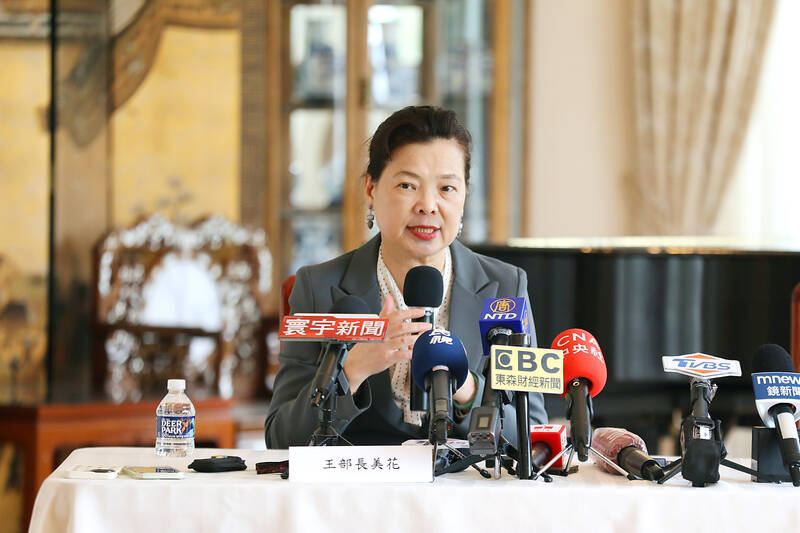Taiwanese and US companies signed seven memorandums of understanding (MOUs) at a high-level trade meeting in Washington to enhance cooperation in fields such as renewable energy and 5G communications, the Ministry of Economic Affairs said on Thursday.
The MOUs inked during the first physical meeting under the Technology Trade and Investment Collaboration (TTIC) framework could help both countries enhance cooperation and stabilize global supply chains, said Minister of Economic Affairs Wang Mei-hua (王美花), head of the Taiwanese delegation.
Participating Taiwanese companies included state-run Taiwan Power Co (Taipower, 台電), Aerospace Industrial Development Corp (AIDC, 漢翔航空), Quanta Cloud Technology (雲達科技), HTC Corp (宏達電), TMY Technology Inc (稜研科技) and Edgecore Networks Corp (鈺登), the ministry said.

Photo: CNA
On the US side, representatives from General Electric Co (GE), Intel Corp, RingCentral Inc, Lumen Technologies and DuPont were present.
One of the MOUs involves GE helping AIDC use hydrogen-based power-generation technologies to reduce greenhouse gas emissions and develop its own maintenance capabilities on a turbine-supported electrification project, the ministry said.
GE is also to work with Taipower to achieve its goal of net zero carbon emissions by 2050, the ministry said.
The MOUs also cover information and communications technology cooperation in areas such as smart manufacturing, entertainment, healthcare and 5G connectivity, it said.
Besides attending the TTIC meeting, the first since the body was established in December last year for Taiwan and the US to develop commercial programs and bolster critical technology supply chains, Wang said her trip, which runs from Oct. 9 to tomorrow, has also facilitated exchanges between about 80 Taiwanese and US firms.
Wang said the exchanges had generated a positive response, and she believed there would be more TTIC meetings next year, although the date and location were still to be decided.
Wang was to visit companies in Silicon Valley, including Applied Materials Inc, after wrapping up her visit in Washington yesterday.
She expressed hopes that her visit could generate orders and potential investments of up to NT$30 billion (US$940.91 million).
Wang reiterated Taiwan’s critical role in the global semiconductor industry, supported by a solid industry cluster, high-quality talent and a sound legal framework for semiconductor intellectual property protection.
Any disruption to the semiconductor industry in Taiwan could have a severe impact on the global tech industry and world economy, she said, calling for stable relations between Taiwan and China.

TAKING STOCK: A Taiwanese cookware firm in Vietnam urged customers to assess inventory or place orders early so shipments can reach the US while tariffs are paused Taiwanese businesses in Vietnam are exploring alternatives after the White House imposed a 46 percent import duty on Vietnamese goods, following US President Donald Trump’s announcement of “reciprocal” tariffs on the US’ trading partners. Lo Shih-liang (羅世良), chairman of Brico Industry Co (裕茂工業), a Taiwanese company that manufactures cast iron cookware and stove components in Vietnam, said that more than 40 percent of his business was tied to the US market, describing the constant US policy shifts as an emotional roller coaster. “I work during the day and stay up all night watching the news. I’ve been following US news until 3am

UNCERTAINTY: Innolux activated a stringent supply chain management mechanism, as it did during the COVID-19 pandemic, to ensure optimal inventory levels for customers Flat-panel display makers AUO Corp (友達) and Innolux Corp (群創) yesterday said that about 12 to 20 percent of their display business is at risk of potential US tariffs and that they would relocate production or shipment destinations to mitigate the levies’ effects. US tariffs would have a direct impact of US$200 million on AUO’s revenue, company chairman Paul Peng (彭雙浪) told reporters on the sidelines of the Touch Taiwan trade show in Taipei yesterday. That would make up about 12 percent of the company’s overall revenue. To cope with the tariff uncertainty, AUO plans to allocate its production to manufacturing facilities in

Six years ago, LVMH’s billionaire CEO Bernard Arnault and US President Donald Trump cut the blue ribbon on a factory in rural Texas that would make designer handbags for Louis Vuitton, one of the world’s best-known luxury brands. However, since the high-profile opening, the factory has faced a host of problems limiting production, 11 former Louis Vuitton employees said. The site has consistently ranked among the worst-performing for Louis Vuitton globally, “significantly” underperforming other facilities, said three former Louis Vuitton workers and a senior industry source, who cited internal rankings shared with staff. The plant’s problems — which have not

COLLABORATION: Given Taiwan’s key position in global supply chains, the US firm is discussing strategies with local partners and clients to deal with global uncertainties Advanced Micro Devices Inc (AMD) yesterday said it is meeting with local ecosystem partners, including Taiwan Semiconductor Manufacturing Co (TSMC, 台積電), to discuss strategies, including long-term manufacturing, to navigate uncertainties such as US tariffs, as Taiwan occupies an important position in global supply chains. AMD chief executive officer Lisa Su (蘇姿丰) told reporters that Taiwan is an important part of the chip designer’s ecosystem and she is discussing with partners and customers in Taiwan to forge strong collaborations on different areas during this critical period. AMD has just become the first artificial-intelligence (AI) server chip customer of TSMC to utilize its advanced